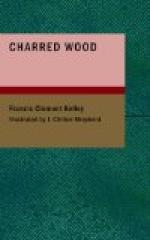“I see,” said Mark, though he didn’t see any more than the agent. “But the priest doesn’t take it hard, does he?”
“Not that you could notice,” Saunders answered. “The Padre’s jolly—smart, too—and a bookman. He has books enough in that little house to start a public library, but he’s too poor now to buy many of the kind he’s daffy over—old stuff, you know, first editions and the like.”
They crossed the street to the rectory, an old-fashioned house nestling among the trees, the parapet and pillars of its broad veranda almost hidden by a heavy growth of ampelopsis. In front of the house, a stretch of well-kept lawn was divided from the public walk by a hawthorn hedge, and, cutting through its velvety green, a wide graveled pathway swept up to the steps whose sharp angle with the veranda was softened by a mass of low-growing, flowering shrubs. To the side, extending towards the church, the hedge was tripled, with a space of some six feet between. The lower branches of the evergreens forming the second row were scarcely higher than the hawthorn in front; while, in their turn, the evergreens were barely topped by the silver maples behind. That triple hedge had been the loving care of the successive priests for fifty years and served as an effectual bar to the curiosity of the casual passer-by. In the little yard behind its shelter the priest could read or doze, free from the intrusive gaze of the village.
Father Murray, who was comfortably reading on the veranda, arose as his two visitors approached.
Saunders spoke quickly. “Don’t worry, Padre. I ain’t goin’ to get after you again to sell you another set. I just thought I’d like to have you meet my friend, Mr. Griffin. I know you’ll like him. He’s bookish, too, and an Englishman. Then, I’m off.” Suiting the action to the word, the agent, raising his hat, walked down the graveled path and down toward the hotel.
Father Murray took Mark’s hand with a friendly grip quite different from the bone-crushing handshake he so often met in America. Mark gazed thoughtfully at his host. With his thin but kindly face and commanding presence, the priest seemed almost foreign. What Mark saw was a tall—he was six feet at least of bone and muscle—and good-looking man, with an ascetic nose and mouth; with hair, once black, but now showing traces of white, falling in thick waves over a broad brow. Mark noticed that his cassock was old and faded, but that reddish buttons down its front distinguished it from the cassocks of other village priests he had seen on his travels.
“You are welcome, Mr. Griffin—very welcome.” Mark found Father Murray’s voice pleasing. “Sit down right over there. That chair is more comfortable than it looks. I call it ‘Old Hickory’ because, though it isn’t hickory, yet it began life in this old house and has outlived three pastors. Smoke?”
“Thanks, I do—but a pipe, you know. I’m hopelessly British.” Mark pulled out his pipe and a pouch of tobacco.




